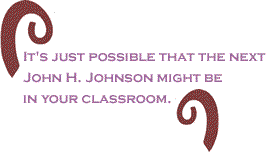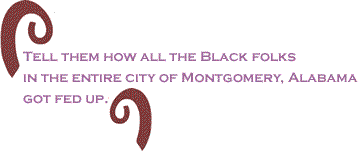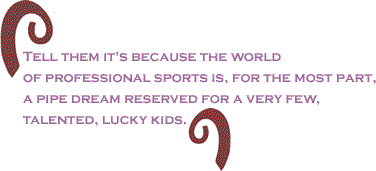
|
|||||||||||||||||||||
|
Dear Teacher, Time's up. Time to get back to work. Before you know it, kids will be everywhere. Over the next nine months, they'll see you as much as they see their own parents. Maybe more. You are among the brightest, most dedicated, most important people they will encounter in their young lives. So, in between all the obligatory "curriculum" stuff about Abraham Lincoln, obtuse angles, and prepositional phrases, I thought I'd suggest a few lessons for character-building – things that have happened very recently, involving people who look just like your students. ENGLISH LIT: Somewhere between Shakespeare and Hemingway, you might say something about John H. Johnson. Tell them how he started a publishing empire way back in 1942 when it was un-thinkable for a Black man to do so, and how it was just as indelible as Knight-Ridder or Scripps-Howard. Show them a copy of Ebony or Jet. They'll recognize it. His magazines were the first to cast the spotlight on the successes of our culture. Mr. Johnson passed away over the summer, but the magazines will continue under the direction of Mr. Johnson's daughter, Linda Johnson Rice. Tell your kids that Mr. Johnson succeeded because he believed in himself. And it's just possible that the next John H. Johnson might be in your classroom. Ask your students if they believe in themselves.
GEOGRAPHY: Pull out a map of Illinois and show them Pike County. In recent weeks, the National Register of Historic Places gave recognition to a huge pasture there. I know pastures don't hold a lot of meaning for city kids, but this one is different. It is the site of the first U.S. town ever incorporated by a Black man. His name was Frank McWorter, and he named the town New Philadelphia. Mr. McWorter settled there in 1836 after buying his way out of slavery. He sold plots of land to people of all races. New Philadelphia ultimately grew to a population of 170. But the railroad developers passed over it, and the town began to dry up. By the 1930's it was gone. The designation as an historic place has now drawn archaeologists to the site, and because of a Black man's vision, we are likely to hear much more about New Philadelphia, Illinois as time goes by. HISTORY: No doubt, your curriculum will include the fact that this year marks the 60th anniversary of the end of World War Two. But try and slide-in another big anniversary: the Montgomery bus boycott began 50 years ago. It was a flashpoint for the civil rights movement. Rosa Parks refused to give up her seat to a white man on a bus, and got arrested. Can you imagine that? Tell them how all the Black folks in the entire city of Montgomery, Alabama got fed up, and refused to ride the bus until that law was stricken from the books. Tell them how a young minister named Martin Luther King, Jr. rallied folks and kept them encouraged, because it wasn't easy. Maybe even have them send a class "Get Well" card to Dr. King's widow, Coretta Scott King, who suffered a stroke in recent weeks.
SOCIAL STUDIES: You might get a pretty good class discussion going about the guy who was found guilty, just this past June, of the murders of three civil rights workers in 1964. His name is Edgar Ray Killen. The workers, James Chaney, Michael Schwerner, and Andrew Goodman, were killed in Mississippi. These days, it's hard to imagine having to use a "colored" restroom or a "colored" water fountain. But it was a fierce battle to attain that right, and it cost those three guys their lives. As for Edgar Ray Killen, he's now 80 years old and in failing health. So he's already lived the American Dream. Ask the kids: did he get off light? Then remind them that history repeats itself, if you allow it to. PHYS ED: Before you hand out the bats and balls, let them know that you, too, harbor a special, racial pride in people like Michael Jordan and the late Walter Payton. Point to their favorite current athletes, and watch their chests bulge with that pride. Then ask them about some of the names you know, athletes who were sure bets to make it to the NBA or NFL, but who couldn't make the grade, or got hurt, or worse yet, succumbed to some of the evil temptations of the streets. I had the pleasure of seeing Earl "The Goat" Manigault, and a guy they called "Herman the Helicopter" (imagine the hang-time of someone who warrants that nickname). They won't recognize those names. Tell them it's because the world of professional sports is, for the most part, a pipe dream reserved for a very few, talented, lucky kids. Tell them how proud you'll be if any of them should make it, but be sure they understand that they need to be ready to do something else, just in case. HEALTH: I'm sure you'll tell the kids about the need to eat properly. Be sure to eat your vegetables. But don't let them leave your classroom before telling them that Black men in this country have the highest rate of prostate cancer in the entire world.
And just to be clear, I know you can't do it all. I know there are too many parents who fail to recognize their role in the education of their own children. But without you, our kids don't have a chance. Have a relevant school year. Sincerely, Roger Brown Roger Brown is a veteran broadcast journalist, currently writing for the FOX-owned TV station in Chicago, WFLD. He has also worked for NBC News and the NBC-owned TV station in Chicago, WMAQ. Mr. Brown's e-mail address is: [email protected] Editor’s Note to educators: BC highly recommends Putting the Movement Back into Civil Rights Teaching: A Resource Guide for Classrooms and Communities, edited by Deborah Menkart, Alana D. Murray and Jenice L. View, with foreword by Congressman John Lewis. The 562-page guide is a publication of the Poverty & Race Research Action Council (PRRAC) with contributions from Rethinking Schools. Guide companion website: www.civilrightsteaching.org. |
Your comments are always welcome. Visit the Contact Us page to send e-Mail or Feedback or Click here to send e-Mail to [email protected] e-Mail re-print notice
If you send us an e-Mail message we may publish all or part of it, unless you tell us it is not for publication. You may also request that we withhold your name. Thank you very much for your readership. |
| September 8 2005 Issue 149 |
|||||||||
|
|||||||||
|
|
|||||||||
| Printer Friendly Version | |||||||||
 |
|||||||||
 |
|||||||||
| |
|||||||||
| |
|||||||||




























